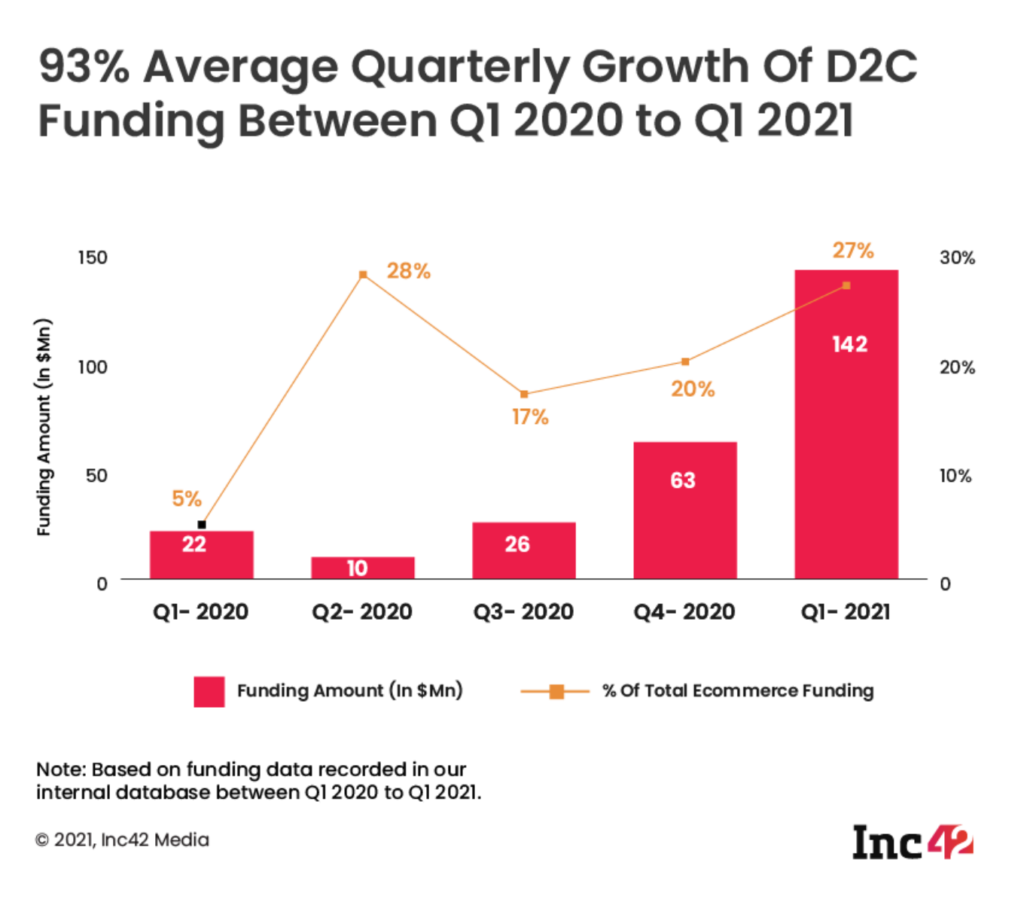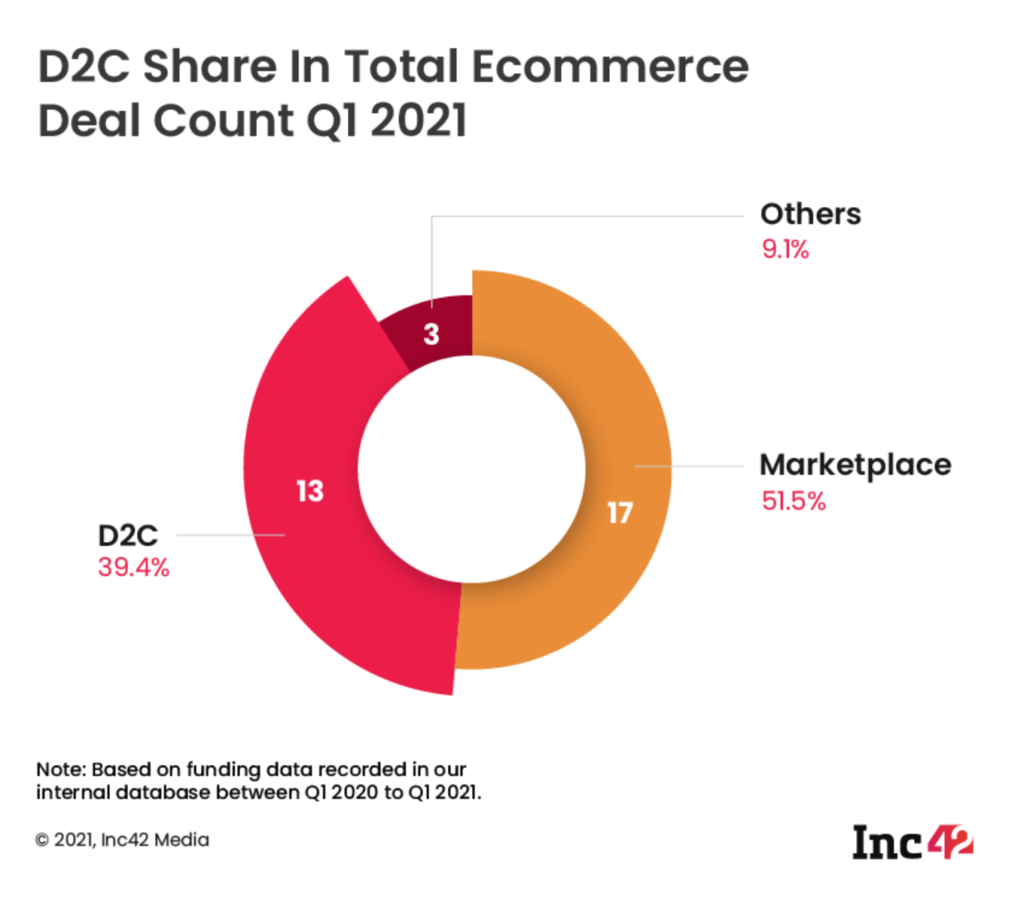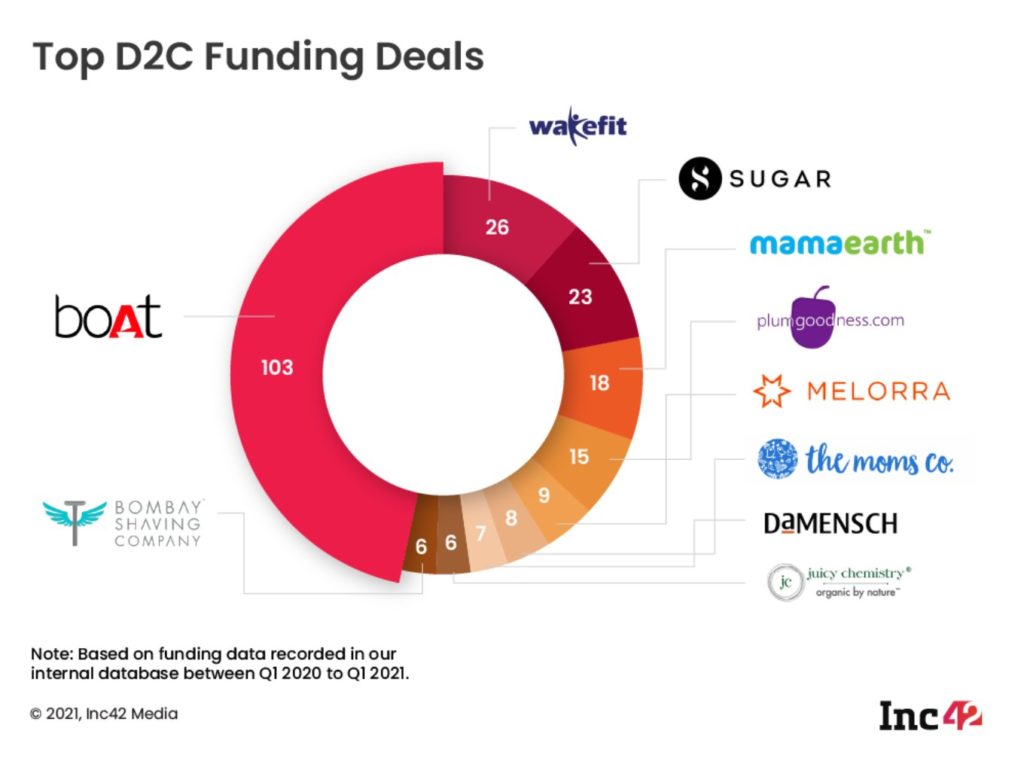Ecommerce was the top-funded sector at $520 Mn and ranked third in terms of deal count with 33 deals
In the fourth quarter of 2020, ecommerce startups raised funding worth $313 Mn, which was 9% of the total funding amount for Indian startups at $3.5 Bn that quarter
But in the current quarter, the funding amount for ecommerce startups has grown to $520 Mn, which is 18.9% of the total startup funding amount of $2.7 Bn

Shopping on the Internet. A young woman with a smartphone shopping in the online store. Vector illustration in the style of paper cutting. Pink background
Can D2C or direct-to-customer be the harbinger of growth for India’s burgeoning ecommerce sector, where funding had been largely going to B2B platforms till late 2020? That certainly seems true for the Indian startup ecosystem, where funding deals for startups with native D2C platforms picked up pace sharply in the first quarter of 2021.
According to Inc42 Plus data till March 20, 2021, Indian startups raised $2.7 Bn from 268 funding deals. Ecommerce was the top-funded sector at $520 Mn and ranked third in terms of deal count with 33 deals.
The share of ecommerce to the total funding for Indian startups has also risen substantially. In the fourth quarter of 2020, ecommerce startups raised funding worth $313 Mn, which was 9% of the total funding amount for Indian startups at $3.5 Bn that quarter. But in the current quarter, the funding amount for ecommerce startups has grown to $520 Mn, which is 18.9% of the total startup funding amount of $2.7 Bn. Our analysis, in an Inc42 Plus report, titled, Indian Tech Startup Funding Report Q1 2021, shows that D2C and vertical ecommerce startups are fuelling investor confidence in the ecommerce ecosystem.

Consider this: In the first quarter of 2020, D2C startups raised $22 Mn, which was 5% of the total ecommerce funding that quarter. Next quarter i.e. Q2 2020, funding for D2C startups fell to $10 Mn, but its share of the total ecommerce funding rose to 28%. This was when the effect of the Covid-19 pandemic began to be seen on the funding deals for Indian startups.

In Q3, D2C startups accounted for 17% of the total ecommerce funding; in Q4, 20%; and finally, in the quarter ended March 2021, D2C startups raised $142 Mn, which was 27% of the total funding for ecommerce startups. More importantly, between Q1 2020 and Q1 2021, the funding amount for D2C startups has registered a 93% average quarterly growth.
Some of the major Indian D2C startups to raise funding in Q1 2021 include consumer electronics tech startup boAt, which raised $100 Mn in a venture round from Warburg Pincus; Sugar Cosmetics, which raised $21 Mn in a Series C round led by Elevation Capital; and, personal care brand Juicy Chemistry, which raised $6.3 Mn in a Series A round led by Belgium-based family-owned private investment firm Verlinvest. Bombay Shaving Company, Zouk and Bewakoof were some of the other prominent D2C startups which raised funding in the first quarter of 2021, ending March.

It is worth mentioning that none of the startups mentioned above espouse a pure-play D2C approach. Instead, the intense competition in niche segments such as men’s grooming, personal care and hygiene products and nutrition brands has meant that most of these companies have come to rely on an omnichannel approach for selling their products. Take the example of men’s personal grooming brand Bombay Shaving Company. The company raised $6.1 Mn in January this year, when one of the founders, Shantanu Deshpande told Inc42 that while 25% of the company’s revenue is through retail sales, the rest is split equally between its native site and third-party ecommerce platforms at around 35% each.
Deshpande explained the philosophy behind the omnichannel D2C strategy, which is at the core of most new-age brands in India.
“The D2C website is where you’ll find most of our branding material. It is the one-stop-shop for our most loyal customers. Selling on Amazon and Flipkart is key because we are a young brand, so we have to put ourselves out there and acquire new users. That becomes a challenge for us in 2 Mn retail stores where customers would naturally prefer more established brands placed prominently on the shelf,” he said, adding that the company’s revenue has grown 3x when compared to the pre-Covid sales.
Similarly, in previous conversations with Inc42, boAt cofounder Aman Gupta detailed the tactic behind first building the brand on marketplaces and then opening up a D2C sales channel through a native website.
“If we had paid to get hits on our own website initially, we would have lost out on money and sales to target those customers. Hence, we took an early decision to build the brand in the marketplace. Now that the brand has been built, we can go offline, or (sell on) our own website; it does not matter,” he had said.
When boAt was selling solely on ecommerce platforms, it was losing out on valuable customer data, and also failed to retarget customers. But of late, the brand is getting a lot of hits on its website, and the data from these visits will be utilised for marketing and sales success.
As for the total funding amount of $2.7 Bn for Indian startups in Q1 2021, it was 12% lower than the quarterly average (2017-2020) of $3.1 Bn.
On the other hand, the deal count was 20% higher than the quarterly average (2017 to 2020) of 223. The combination of a downward trend in the funding amount and an upward trend in the deal count can be attributed to the lower number of mega funding rounds ($100 Mn and above) recorded in Q1 2021. The number of eight mega-rounds recorded in this quarter was 20% lower than the previous quarter Q4 2020 (10) and 27% lower than the 11 deals recorded in Q1 2020.









